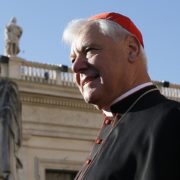Come spiegato anche nella profonda intervista di Gianni Valente al cardinale segretario di Stato Pietro Parolin, la questione della Chiesa in Cina è in fondo una: bisogna risolvere la spaccatura creata dopo che negli anni ’50 e ’60 il Partito comunista ha cercato di obbligare la Chiesa cinese a scegliere tra la fedeltà alla Santa Sede e la fedeltà a Pechino.
Vista con gli occhi di oggi tale pressione è disumana, e certo così fu, ma il momento storico era anche diverso. La Chiesa aveva scomunicato l’ideologia atea marxista-leninista e la Cina, governata dal partito comunista, considerava i cattolici cinesi come una specie di quinta colonna dei nemici, dei nazionalisti del KMT di Chiang Kai-shek. Questi, asserragliati a Taiwan dal 1949, sognavano di liberare la Cina dai comunisti.
Cioè, come tante volte nella storia, religione e politica si incrociavano e non nel modo migliore.
La Lettera di papa Benedetto XVI del 2006 cercava di risolvere il problema, ma decenni di lotte non sono facilmente risolvibili. In oltre un decennio si sono fatti molti passi avanti ma tante questioni, figlie di decenni di inimicizia e odio, sospetti e lotte fratricide nella Chiesa cinese, restano.
Questo è il retroterra dove Santa Sede e governo di Pechino stanno cercando di trovare un terreno comune per la vita della Chiesa e anche per la vicenda delle due diocesi di Shantou e Mindong, dove per motivi diversi due vescovi nominati dal papa farebbero posto a due presuli inizialmente voluti da Pechino.
Il cardinale Zen ha recentemente detto che lo scisma è già lì e ha sottolineato: «Non è un bene cercare di trovare un terreno comune per colmare la pluridecennale divisione fra il Vaticano e la Cina? Ma ci può essere qualcosa di “comune” con un regime totalitario? O ti arrendi o accetti la persecuzione, ma rimanendo fedele a te stesso (si può immaginare un accordo fra san Giuseppe e il re Erode?)».
Forse questo è proprio il punto: perché non immaginare un accordo fra san Giuseppe ed Erode? Perché opporsi a questo sforzo certamente titanico? Gesù non aveva fermato san Pietro che voleva opporsi ai romani che venivano a prenderlo e ha scelto di morire sulla croce? Come facciamo a essere e dirci cristiani se chiudiamo il nostro cuore a Erode, chiunque esso sia?
Personalmente, ma non capisco di teologia, parlerei e vorrei in paradiso anche il diavolo, quel buon diavolo che ne Il Maestro e Margherita di Bulgakov attraverso il male insegna all’uomo la bontà di Dio.
Ciò detto, non è ben certo che la Cina oggi sia come Erode.
C’è un’altra questione forse più profonda. Si tratta di riconciliare la Chiesa, cinese e non, riportarla ed essere una. Per questo c’è bisogno di non avere vinti o vincitori, perché quando qualcuno vince, qualcun altro perde e le spaccature si approfondiscono. Il cardinale Zen, i suoi dubbi, i suoi tormenti sono parte della Chiesa, io personalmente non vorrei separarmi da lui. Ma forse bisogna separarsi dall’idea di separazione.
Oggi ci sono tensioni nella Chiesa, sorpresa e stupefatta da questo papa che ha aperto e apre al mondo, parlando a tutti. Ci sono poi anche tensioni crescenti nel mondo intorno e contro la Cina. Tutto questo non aiuta, anzi ostacola ogni tentativo di riconciliazione.
Una scelta forse legittima potrebbe essere scrollare le spalle e dire “è la volontà di Dio”. Ma la volontà di Dio è non arrendersi e accettare passivamente queste divisioni comprensibili, ragionevoli.
Il papa ci invita a riconciliarci, questo è il messaggio della misericordia del papa.
The issue of the Holy See and China: Dealing with Herod?
As explained in the profound interview by Gianni Valente to the Vatican Secretary of State Cardinal Pietro Parolin the question of the Church in China basically boils down to this: We must solve the rift created in the 1950s and 1960s when the Communist Party tried to force the Chinese Church to choose between fidelity to the Holy See and loyalty to Beijing.
Seen through the lens of today, this pressure was certainly inhumane, but the historical moment was different. The Church had excommunicated the atheistic Marxist-Leninist ideology, and China, ruled by the Communist Party, regarded Chinese Catholics as a kind of fifth column of its enemies, Chiang Kai-shek’s KMT nationalists. The KMT, barricaded in Taiwan since 1949, dreamed of liberating China from the communists.
It was one of the many times in history when religion and politics crossed in inconvenient ways.
Pope Benedict XVI’s 2006 letter tried to solve the problem, but decades of struggles are not easily unraveled. Over the past decade, there have been many steps forward, but after decades of enmity and hatred, suspicion, and internal struggles in the Chinese Church, lots of questions remain.
This is the background against which the Holy See and the government in Beijing are trying to find common ground for the future of the Church and also for the affairs of the dioceses of Shantou and Mindong, where for different reasons two bishops appointed by the Pope will leave to make room for two new bishops supported by Beijing.
Cardinal Zen recently said that the schism already exists and underlined, «Is not it good to try and find common ground to bridge the decades-long division between the Vatican and China? But can there be something “common” with a totalitarian regime? Either you surrender or accept the persecution but remain faithful to yourself (can you imagine an agreement between St. Joseph and King Herod?)».
Perhaps this is precisely the point: why not imagine an agreement between St. Joseph and Herod? Why oppose this certainly titanic effort? Did Jesus not stop Saint Peter, who wanted to oppose the Romans who came to get him, and chose to die on the cross? How can we be Christians if we close our hearts to the Herods of today, whoever they are?
Personally, I do not understand theology, but I would like to see in Heaven even the devil, that good devil who in Bulgakov’s The Master and Margarita through evil teaches man the goodness of God.
That said, it is not certain that China today is like Herod.
There is another perhaps more profound question. It is a question of reconciliation within the Church, Chinese or otherwise, to reunify it. To reunify it we need no winners: When someone wins, someone else loses and the rifts deepen. Cardinal Zen, his doubts, and his torments are part of the Church. I personally would not want to separate myself from him. But perhaps we need to separate ourselves from the idea of separation.
Today there are tensions within the Church, with some surprised and amazed by this Pope who opened up and opens to the world, speaking to all. Then there are also growing tensions in the world around and with China. All this does not help, but rather hinders any attempt at reconciliation.
Perhaps a legitimate choice could be to shrug and say, “It is God’s will”. But God’s will perhaps is not to give up and passively accept these even understandable, reasonable divisions.
The Pope invites us to be reconciled; this is the message of the mercy from the Pope.





